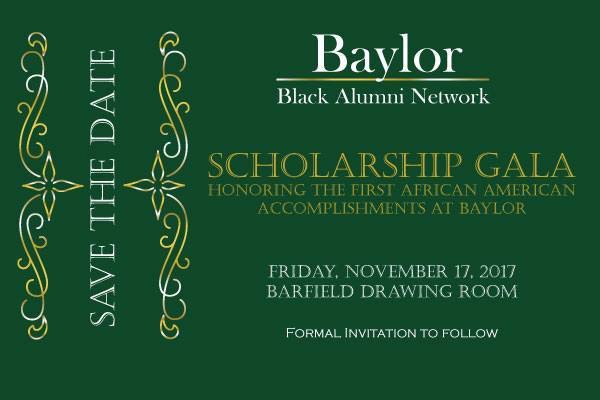By Savannah Cooper | Staff Writer
Navigating through such a transformative period like college is difficult enough for students, on top of that add the difficult responsibility of being the first person of your race to do so.
Dr. Vivienne Malone-Mayes, Rev. Louie Belvet George Sr., Michael Heiskell and several others went through such an experience being the first African Americans at Baylor to break through a racial barrier in the classroom and the field.
Friday starting at 6 p.m. the Black Alumni Network hosted its first ever scholarship gala specifically honoring the first African American accomplishments on campus. Baylor’s student jazz ensemble welcomed nearly 300 guests dressed for black tie three-course meal catered event.
Barbara Ann Walker made history in 1967 as Baylor’s first female African American graduate. Her name alone was met with a standing ovation that she soon returned back to the audience during her speech.
“First off I want to give a hand to you guys, it’s so wonderful to see what you all have done beyond Baylor,” Walker said. “If I had any part in encouraging that by attending Baylor, I’m so happy and I give all the credit to my Lord and Savior.”
Along with Walker was the late Rev. Robert Gilbert’s son, Rev. Dr. Kenyatta Gilbert, who represented him and shared his story.
Dr. Monica Frazier Anderson and Dr. Bernie Lambert were the masters of ceremony for the evening while John Joe facilitated the question and answer portion of the event.
One of the honorees of the night that were apart of the question and answer portion was Tommy Bowman, commonly known as Bo. Bowman came to Baylor in 1966 on a full four-year basketball scholarship, making him not only Baylor’s first black athlete, but the first black scholarship athlete.
Looking back on his time here, Bowman said he realizes God’s favor over his life.
“When I look back, God chose me to come here,” Bowman said. “I don’t have any doubt in my mind about that.They came after me for the scholarship, I didn’t have to apply, didn’t have to stand in line for classes. When I look back I think of how blessed I am.”
One year after attending the historically black school Paul Quinn College in Waco, Walker transferred to Baylor after a history professor encouraged her to apply. Decades later, Walker’s now a retired Licensed Clinical Social Worker for the State of California Department of Mental Health,
Walker’s time at Baylor was met with some push back, but looking into a crowd of successful black Baylor bears of the past, present and future she imparted with them to not stand on the sidelines and watch what’s happening on campus.
“Do not allow yourselves to be ignored while you’re here, participate in all the activities, do whatever you can to help take advantage of the opportunities that are here because Baylor has a lot of opportunities,” Walker said. “Encourage one another, make sure that you’re constanting encouraging one another even when you’re about to graduate, find someone behind you that you can mentor. We have a long road ahead of us, it was amazing to see they’re so many firsts, but I felt sad where we’re still not participating in.”
Looking back at his time here, Bowman acknowledge how important the relationships stemmed from Baylor were to him. They’ve led to two job offers as well as meeting his wife.
“The most important thing that happened to me at Baylor University was relationships,” Bowman said. “Go to class, get all the education that you can because you can’t beat that, but what’s going to really stick with you is the relationships you develop. Right now so many things have happened to me based on my relationships with various people that I’ve met while I was here.”






